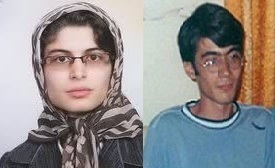Father of Two Political Prisoners Says Prison Conditions Made His Son Sick

Shabnam Madadzadeh (left) and Farzad Madadzadeh (right) are siblings each serving five-year sentences in separate prisons on political charges.
Madadzadeh spoke to the Campaign about the unhygienic conditions at Rajaee Shahr Prison and claimed cell phone jamming units recently installed in the prison could be causing harm to inmates. The Campaign has been unable to independently confirm whether there is a connection between the units and the health conditions, though prisoners’ family members and Kaleme Website have alleged a link.
“I don’t know why prison officials have installed five cell phone jamming units [at Rajaee Shahr Prison] when there are no cell phones in prison. The jamming signals have led to illnesses among the prisoners. My son has developed eczema. We made an appointment for him with a dermatologist. They took him to the hospital to be examined under bad conditions, handcuffed and footcuffed and accompanied by several forces. Though he takes his medication he has not recovered as a result of the prison’s unhygienic conditions and the jamming signals,” Abdolali Madadzadeh told the Campaign.
Kaleme Website wrote on October 23 that the Rajaee Shahr Prison management has installed cell phone jamming devices in prison, alleging these have caused severe headaches and nausea and are threatening the health of political prisoners in the facility.
“Several prison windows are also broken and in this cold weather the authorities neither replace the glass nor place plastic over the open spaces to prevent cold air from flowing in. The prison’s sewer system is also broken and it is overflowing into the bathrooms without any cleanup or repair in progress. The hygienic conditions of that prison are not good at all,” Farzad Madadzadeh’s father told the Campaign.
Regarding the conditions of his daughter, Shabnam Madadzadeh, 28, who is imprisoned at Evin Prison in Tehran, Abdolali Madadzadeh said, “The last time I saw her was a month ago. I live in Tabriz and because of the distance I can’t go to visit with her in Tehran regularly. During the five years my son and daughter have been in prison, they have not been allowed furlough even once and we have not even been given permission for in-person visitations during this time, something to which we are entitled. For the past two years, Shabnam and Farzad have not even been allowed to talk to each other on the phone.”
Asked what request he has of the Iranian judicial authorities, Abdolali Madadzadeh said, “During the five years my children have been in prison, I have repeatedly written to the authorities and I have followed up with them many times. I waited day and night for five years. My wife and I both became sick. But now there are only three more months left before they are released. It’s coming to an end. What request can we have of the judicial officials now? Nothing. Mr. Rouhani had promised to release the political prisoners when he was elected president. We expected this to happen, but it didn’t.”
Shabnam Madadzadeh, former Political Secretary for the Islamic Student’s Association at Tarbiat Modares University in Tehran, was arrested on February 20, 2009. On February 9, 2010, Branch 28 of Tehran Revolutionary Court under Judge Moghiseh sentenced her to five years in prison on charges of “cooperating with the Mojahedin-e Khalgh Organization (MEK).” The sentence was upheld on June 2, 2010. Shabnam Madadzadeh has repeatedly denied these charges.
Farzad Madadzadeh, Shabnam Madadzadeh’s brother, was arrested on February 20, 2009, when he went to a police station after his sister called him, in order to pursue the reasons for her arrest. Branch 28 of Tehran Revolutionary Court sentenced him to five years in prison on charges of “acting against national security,” a sentence that was upheld in full.






